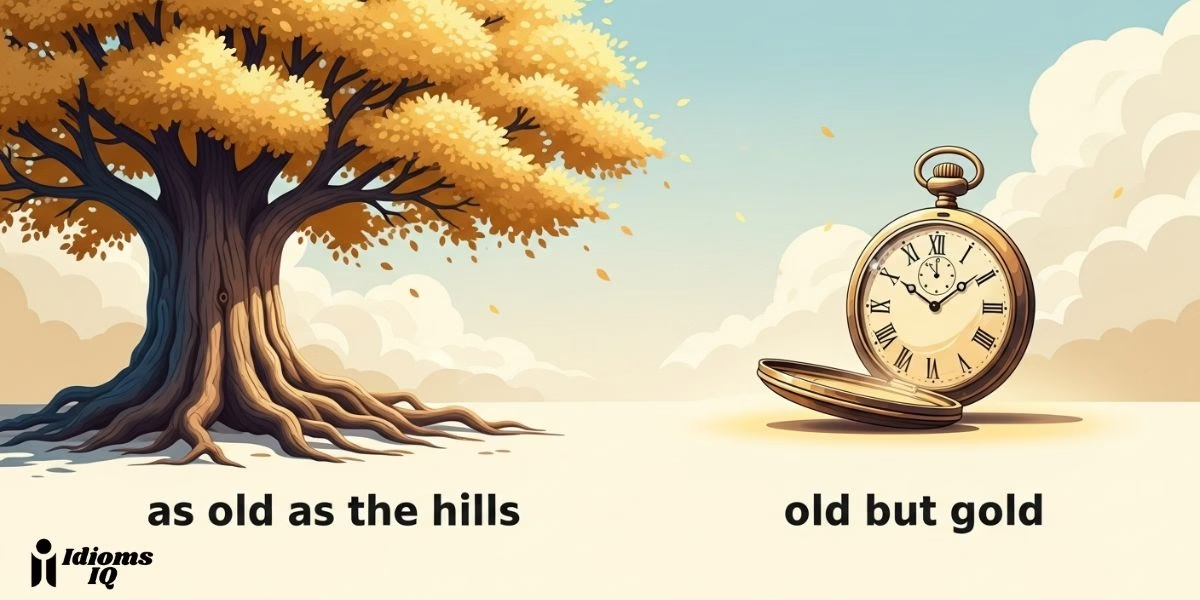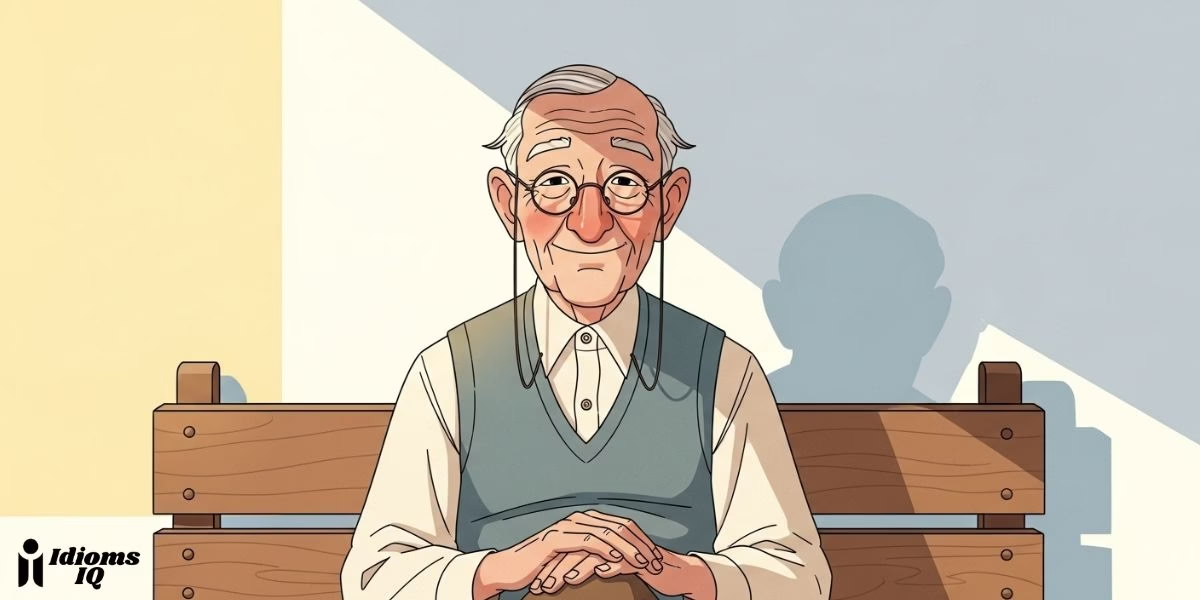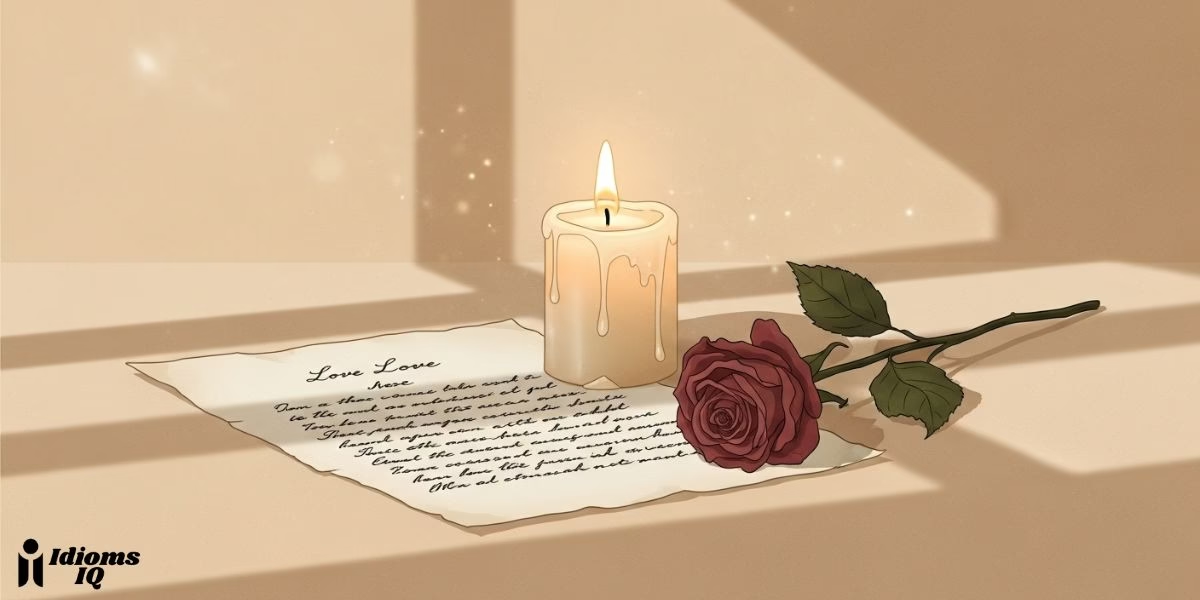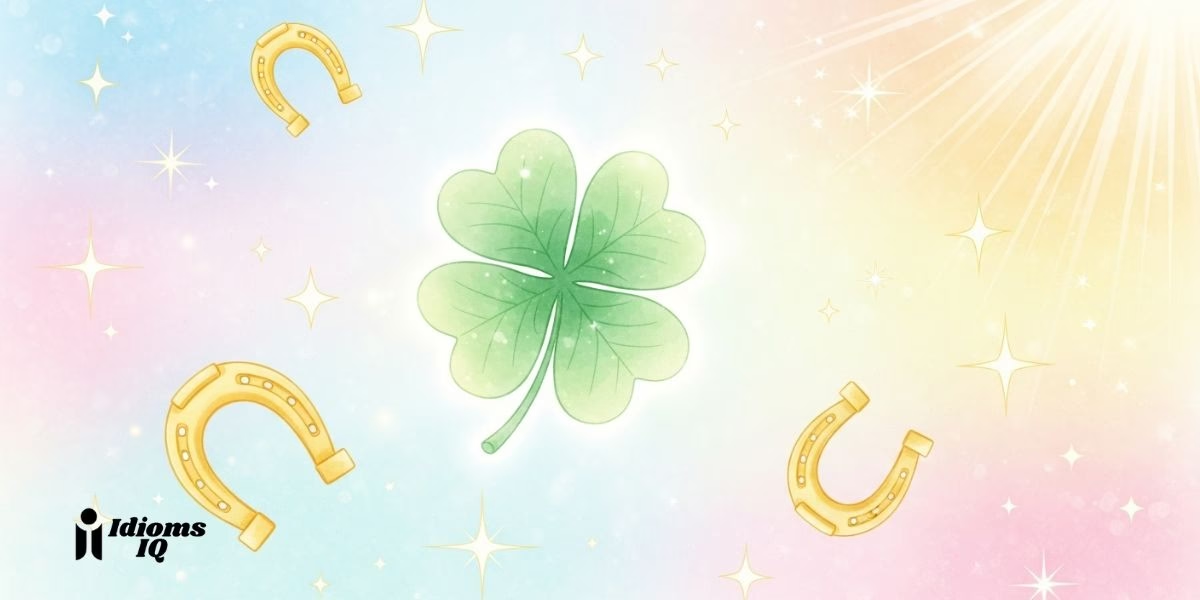
The word “old” can describe so much more than just a number. It can mean wise, experienced, outdated, cherished, or simply worn out. To capture these many shades of meaning, we turn to the rich and colourful world of idioms. An idiom is a common phrase with a figurative meaning that isn’t obvious from the individual words. They are the secret spice of a language, adding character and a sense of shared culture to our conversations.
When we say someone is “as old as the hills,” we’re painting a far grander picture than just stating their age! This article explores 40 classic idioms for “old,” helping you describe age, time, and history with more creativity and emotion.
Related: Idioms for Hard Working
Why We Use Idioms in Art and Language
Idioms add personality and depth to our language, making it more vivid and engaging. In art and writing, they are a powerful tool for characterization and setting a specific tone. Describing a character as an “old hand” at their job instantly conveys experience and reliability. Calling an idea “old hat” quickly establishes it as outdated. Idioms make dialogue feel authentic and descriptions more imaginative, creating a shortcut to a deeper meaning and a stronger connection with the audience through shared cultural understanding.
Idioms for Old
Here is a collection of idioms for describing people, things, and ideas as old, with notes on their tone and usage.
Idioms for People
1. As Old as the Hills
- Meaning: Extremely old.
- Usage Example: “My grandfather has been telling that same story since I was a kid; he’s as old as the hills.”
- This is a common and affectionate way to describe a very old person or a timeless story.
2. Getting On in Years
- Meaning: Becoming old; in the later stages of one’s life.
- Usage Example: “He’s not as fast as he used to be, but he’s still sharp for someone who’s getting on in years.”
- This is a gentle, polite, and respectful way to refer to the process of aging.
3. Long in the Tooth
- Meaning: To be old, or too old for something.
- Usage Example: “I’m a bit long in the tooth to be starting a career as a professional athlete.”
- This idiom originates from the fact that a horse’s gums recede with age, making its teeth look longer.
4. Over the Hill
- Meaning: Past one’s prime; middle-aged or older.
- Usage Example: “They threw him a surprise 40th birthday party with ‘Over the Hill’ decorations.”
- This is a very common, often humorous idiom used for milestone birthdays like 40 or 50.
5. No Spring Chicken
- Meaning: Not young anymore.
- Usage Example: “I can’t stay out all night like I used to; I’m no spring chicken.”
- This is a humorous and informal way for a person to refer to their own age.
6. An Old Hand
- Meaning: A person with a lot of experience in a particular activity or job.
- Usage Example: “Let’s ask Margaret to lead the project; she’s an old hand at managing these things.”
- This is a positive idiom that highlights the value of experience that comes with age.
7. Ripe Old Age
- Meaning: A very advanced age, typically used to describe a long and full life.
- Usage Example: “Her grandmother lived to the ripe old age of 98.”
- This is a positive and celebratory phrase used when talking about a long life.
8. Set in One’s Ways
- Meaning: To be unwilling to change one’s habits, routines, or opinions.
- Usage Example: “My dad will never use a smartphone; he’s too set in his ways.”
- This idiom is often, but not exclusively, associated with older people.
9. One Foot in the Grave
- Meaning: To be very old or very ill and close to death.
- Usage Example: “He’s always complaining about his health, but he’s hardly got one foot in the grave!”
- This is a dark-humor idiom that is often used as an exaggeration.
10. Old-Timer

- Meaning: An old person, especially one who has been in a place or organization for a long time.
- Usage Example: “One of the old-timers at the company told me how things used to be.”
- This can be a respectful term for an experienced person or a slightly dismissive one.
11. An Old Soul
- Meaning: A young person who behaves with the wisdom and calmness of someone much older.
- Usage Example: “The little girl was an old soul, preferring classical music to cartoons.”
- This is a complimentary idiom that praises a young person’s maturity.
12. Golden Years
- Meaning: The period of life after retirement.
- Usage Example: “They were looking forward to traveling the world during their golden years.”
- This is a positive and optimistic term for retirement and old age.
13. Put Out to Pasture
- Meaning: To be forced to retire or moved to a less important position because of age.
- Usage Example: “After the company was restructured, some of the older executives were put out to pasture.”
- This idiom, which comes from retiring old farm horses, often has a negative connotation.
14. Old Fogy / Codger
- Meaning: An old-fashioned, eccentric, or boring old man.
- Usage Example: “He’s a bit of an old codger, always complaining about modern music.”
- These are informal and slightly disrespectful terms, often used with affectionate humor.
15. Dinosaur / Fossil
- Meaning: Someone or something that is extremely old and hopelessly outdated.
- Usage Example: “My dad refuses to use the internet; he’s a total dinosaur.”
- These are humorous but critical terms for someone who is resistant to modern ways.
Idioms for Things and Ideas
16. Old Hat
- Meaning: Outdated, unoriginal, and uninteresting.
- Usage Example: “That style of music is old hat now; nobody listens to it anymore.”
- This idiom suggests something is so familiar and overused that it has become boring.
17. Ancient History
- Meaning: Something that happened so long ago that it is no longer relevant or worth discussing.
- Usage Example: “I’m not still upset about that argument; it’s ancient history.”
- This is a common way to dismiss a past event as unimportant.
18. Past Its Prime / Sell-by Date
- Meaning: No longer in the best condition; past the peak of its quality or usefulness.
- Usage Example: “This old laptop is really past its prime; the battery only lasts for an hour.”
- This idiom, borrowed from food labeling, can be used for objects or even people.
19. That Ship Has Sailed

- Meaning: An opportunity has been missed and it is now too late.
- Usage Example: “I wish I had invested in that company years ago, but that ship has sailed.”
- This idiom describes a past opportunity that is no longer available.
20. Out of the Ark
- Meaning: Extremely old or antiquated.
- Usage Example: “My first computer was a huge machine with a tiny screen; it was straight out of the ark.”
- This idiom humorously references the biblical story of Noah’s Ark to emphasize extreme age.
21. Old School
- Meaning: Having an old-fashioned or traditional quality that is often admired.
- Usage Example: “He believes in writing thank-you notes by hand; he’s very old school.”
- This idiom usually has a positive connotation, implying a respect for tradition and quality.
22. Older Than Dirt
- Meaning: A humorous exaggeration for something or someone very, very old.
- Usage Example: “I found some coins in my grandfather’s attic that look older than dirt.”
- This is an informal and hyperbolic way to describe something ancient.
23. To Have Seen Better Days
- Meaning: To be in poor condition; worn out.
- Usage Example: “My favorite old armchair has seen better days; the springs are gone and the fabric is torn.”
- This is a gentle and slightly sad way to describe an object (or person) that is in decline.
24. Stood the Test of Time
- Meaning: To have remained popular, effective, or of high quality for a very long time.
- Usage Example: “Shakespeare’s plays have stood the test of time and are still performed today.”
- This is a powerful idiom used to praise the enduring quality of a classic.
25. An Old Chestnut
- Meaning: A joke, story, or topic that has been repeated so many times it has become boring.
- Usage Example: “Oh no, not that old chestnut again! Dad, you’ve told that joke a hundred times.”
- This idiom describes something that is old in a tired and unoriginal way.
26. Time-Honored
- Meaning: A tradition, custom, or method that is respected because it has existed for a long time.
- Usage Example: “The town’s annual parade is a time-honored tradition that goes back centuries.”
- This is a formal and respectful phrase used to describe long-standing customs.
27. From the Year Dot
- Meaning: From a very long time ago; since the very beginning.
- Usage Example: “My family has been living in this village since the year dot.”
- This is a British idiom that humorously refers to an unspecified, ancient point in time.
28. Older than Methuselah
- Meaning: Extremely ancient.
- Usage Example: “He inherited a grandfather clock that was older than Methuselah.”
- This idiom refers to the biblical figure Methuselah, who was said to have lived to be 969 years old.
29. You Can’t Teach an Old Dog New Tricks
- Meaning: It is difficult to get someone to change their established habits or learn new things, especially if they are older.
- Usage Example: “I tried to show my grandpa how to use social media, but you can’t teach an old dog new tricks.”
- This is a very common proverb about the difficulty of changing ingrained habits.
30. An Old Flame

- Meaning: A person someone was in a romantic relationship with in the past.
- Usage Example: “He ran into an old flame at the reunion, and they spent the evening catching up.”
- This idiom describes a past love that may still hold a spark of warmth.
31. Second Childhood
- Meaning: A period in an old person’s life when they become mentally and physically frail and behave like a child.
- Usage Example: “After he started playing with his old train set again, his family joked he was in his second childhood.”
- This idiom is often used with gentle humor but can also describe the serious effects of senility.
32. Been Around the Block
- Meaning: To have a lot of experience with life and the world; to be worldly-wise and not easily fooled.
- Usage Example: “You can’t trick her with a scam like that; she’s been around the block a few times.”
- This phrase implies that someone has a wealth of practical, real-world experience.
33. Older and Wiser
- Meaning: To have gained wisdom through the experiences that come with aging.
- Usage Example: “He regretted his youthful mistakes, but he was older and wiser now.”
- This is a common and positive phrase that directly links the process of aging with an increase in wisdom.
34. Grizzled Veteran
- Meaning: An experienced person who has been in a particular field or activity for a very long time.
- Usage Example: “The grizzled veteran of the police force was called in to handle the complex case.”
- “Grizzled” refers to having gray or gray-streaked hair, so this idiom literally paints a picture of an older, experienced individual.
35. Antediluvian
- Meaning: Extremely old, ancient, and hopelessly outdated.
- Usage Example: “His views on technology were positively antediluvian; he still thought the fax machine was a new invention.”
- This formal and powerful word literally means “before the flood,” referring to the biblical flood in the Book of Genesis.
36. Hoary with Age
- Meaning: Very old and white or grey-haired; ancient and worthy of respect.
- Usage Example: “The professor, hoary with age, shared stories from his long and distinguished career.”
- “Hoary” means grayish-white and is often used to describe something that is both ancient and venerable.
37. Tried and True
- Meaning: An old method, object, or piece of advice that has been proven to be reliable and effective over a long period.
- Usage Example: “Forget those new fad diets; a balanced diet and exercise is the tried and true method for staying healthy.”
- This idiom praises something for its age because its long existence has proven its worth.
38. The Old Guard
- Meaning: The original, traditional, or long-serving members of a group who are often resistant to change.
- Usage Example: “The old guard at the company was skeptical of the new CEO’s modern ideas.”
- This term can be neutral, but it often implies a conservative group that is being challenged by new leadership.
39. To Rob the Cradle
- Meaning: A humorous or critical phrase for having a romantic relationship with someone who is significantly younger than you.
- Usage Example: “Her new boyfriend is twenty years younger than her; everyone is accusing her of robbing the cradle.”
- This idiom is informal and is used to comment on a large age gap in a relationship.
40. To Collect Dust

- Meaning: To be old, unused, and to have been sitting around for a very long time.
- Usage Example: “My old guitar is just collecting dust in the attic; I haven’t played it in years.”
- This idiom creates a clear visual image of an object that has been neglected and forgotten due to its age or disuse.
Practice Your New Vocabulary: Fill in the Blanks
Ready to test your knowledge? Fill in the blanks with the best idiom from the list.
- That fashion trend is so outdated; it’s really ________________.
- My grandmother is still very active and says she is certainly ________________.
- He’s worked here for 40 years and is an ________________ at negotiating deals.
- I’d love to learn Japanese, but I think at my age, ________________.
- His argument about the past is no longer relevant; it’s ________________.
- The politician is considered a ________________ by the younger members of the party because of his outdated ideas.
- This classic novel has ________________ and is still a bestseller.
- I’m only 40, but my kids threw me an “________________” birthday party.
- She is only twelve, but she has the wisdom and calm of an ________________.
- The old building has definitely ________________; it needs a lot of repairs.
Answers
- old hat
- no spring chicken
- old hand
- that ship has sailed (or you can’t teach an old dog new tricks)
- ancient history
- dinosaur
- stood the test of time
- over the hill
- old soul
- seen better days
Conclusion
Idioms for the concept of “old” reveal the many ways we view age and time with respect, with humor, with nostalgia, and sometimes with frustration. These expressions add character and nuance to our language, allowing us to convey a complex idea in a few simple words.
By understanding and using these idioms, you can make your writing and conversations more colorful, descriptive, and insightful. We encourage you to listen for these phrases and appreciate them as the time-honored treasures of our language. If you enjoyed this collection, explore our other articles on figurative language to continue your journey into the art of expression!






